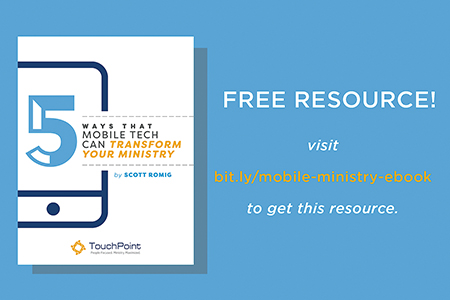
By Scott Romig
 When’s the last time you checked your phone?
When’s the last time you checked your phone?
Recent studies have found that the average person touches their phone 2,617 times a day! The image of people wandering around, heads buried in their mobile devices, perilously unaware of their surroundings has become something of a cultural strawman.
Last year, Chick-fil-a franchise owner Brad Williams famously launched the “Cell Phone Coop” challenge in an effort to motivate people to put away their mobile phones and engage with one another face-to-face. In exchange for a free dessert, diners at Chick-fil-a would be provided with a cardboard box in which all the members of a party were to place their phones, promising not to retrieve them until the end of the meal.
While it’s wise to consider the pitfalls of being perennially plugged-in, it’s also important to acknowledge how mobile phones can influence behavior, especially when it comes to ministry and discipleship. Many churches have started to adopt mobile-friendly technologies, such as uploading their sermons into podcasting platforms or adapting church websites to be mobile-responsive. But these efforts only scratch the surface of the possibilities available at our fingertips.
The following are just three practical ways church leaders can leverage mobile technology to drive discipleship in ministry.
 #1: Assign tasks to lay ministers
#1: Assign tasks to lay ministers
Built within the definition of discipleship is the idea that leaders in the church are to find, grow and deploy other leaders. Churches commonly accomplish this through lay ministers and / or small group leaders. But managing dozens, hundreds or even thousands of lay ministers can quickly become a logistical nightmare. Any system that relies on manual processes is likely to succumb to human error.
By relying on the smartphone’s ubiquity, churches can now use apps that sync up with the church management system. Lay leaders can receive information about church initiatives, report attendance, and make notes about the members they are discipling. This not only provides the church with data about who is and isn’t engaging in ministry, but it also allows the church to be proactive when they see dips in a given member’s attendance. Employing push notifications within the app, the church can instruct lay ministers to check on a lapsed member.
#2: Host church resources in a dedicated church app
When you think about it, smartphones are pretty miraculous devices. Christians just a few hundred years ago would have considered themselves wealthy if they owned a personal copy of the Bible. Nowadays, we can access any translation of God’s Word with a mere swipe of our finger. Churches today are able to host all their teachings — from sermons, to equipping webinars, to Bible studies — in convenient, church-branded apps. Offering mobile-ready versions of church teachings empowers your members to access resources at any time and in any place.
#3: Make giving convenient through mobile
The power of the offering plate has always been its immediacy. People who come prepared to give with a cash or check don’t have to ask where to place their gift. In 2017, however, many people — especially younger members — don’t carry cash or checks on their person.
Though many churches offer online giving, limiting donations to a desktop-only platform means people have to wait until they get home to give rather than when the spirit compels them in the moment. Mobile giving and text-to-give provides members the ability to fund the ministry initiatives that stir their affections on-the-go. This increases the chances that your church will have the resources it needs to accelerate discipleship.
As mobile technology becomes more pervasive in our culture and churches, it’s vital that church leaders leverage innovation in the spreading of the Gospel. Though there is indeed a time and place to “unplug,” we don’t have to fear new technologies; rather, we should harness them in connecting people to one another, to their church and, most important, to Jesus Christ.
Scott Romig is Vice President, Sales & Marketing Technology Products at TouchPoint Software in Dallas. A self-proclaimed “nerd evangelist,” he has a strong drive to help churches disciple their members and raise dollars to fuel their mission. Romig can also be found playing on the worship team at One Chapel in Austin, Texas, or with his band, Dexter Freebish.


